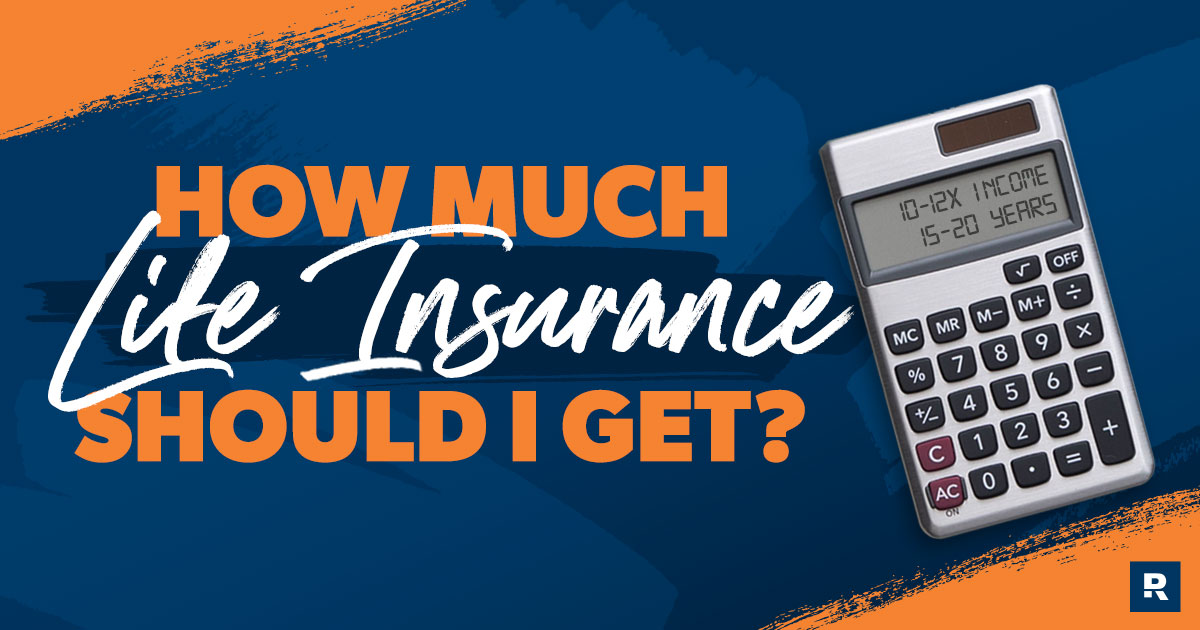
Key Takeaways
- Aim for life insurance coverage equal to 10–12 times your annual income to provide your family with a comfortable financial cushion.
- Choose a term life insurance policy lasting 15–20 years to cover the period between having dependents and becoming self-insured.
- Stay-at-home parents should also have a life insurance policy worth 10–12 times the cost of covering childcare, cleaning, cooking and anything else they take care of.
- We recommend term life insurance over whole life because of term’s simplicity, affordability and focus on income replacement without extra fees or complex investment components.
So, you know you need to get life insurance because you’re a responsible adult with a bunch of people you love depending on you (like your wonderful spouse and the bundle of joy who politely asks for a drink at 2 a.m.). But you’ve still got a question: How much life insurance do I need?
Compare Term Life Insurance Quotes
I’ll get into why below, but here’s the short answer:
- Coverage equal to 10–12 times your annual income
- Term of 15–20 years (how long the policy lasts)
- Level term policy (so the premium stays the same)
For example, if you make $50,000 a year, you need a policy worth around $500,000–600,000.
Calculate How Much Life Insurance You Need
It’s easy to find out how much life insurance you need with a calculator. Or if you’re old-school, paper and pencil will still do the trick.
Use This Calculator
You can get a quick idea of how much you need (and save some brain calories while you’re at it) by using this life insurance calculator.
Using your annual income, how much you’ve saved for retirement, and how much debt you have, this tool tells you roughly how much life insurance you should get.
How to Calculate How Much Life Insurance You Need Manually, Step by Step
Here’s some quick back-of-the-napkin math for figuring out how much life insurance you need:
- Multiply your annual income by 10–12.
- Calculate the value of all the work any stay-at-home parent does and multiply that by 10–12.
- If you have a mortgage, figure out how much of that is left to pay and add that in (or just multiply by 12 instead of 10).
- If you have any other significant debt, multiply by 12.
Here's A Tip
On average, stay-at-home parents need their own policy worth $250,000–400,000. Think of all they do (like food-making, kid-toting and housecleaning). Calculate how much it would cost each year to pay people to do all that!
Example Calculation: Life Insurance for a Family
Let’s pretend we have a friend named Alex, a teacher in his 30s, who’s shopping for life insurance. Here are his steps:
- At the top of his napkin (he’s just finished up brunch), Alex writes down “10–12 times my annual income” since that’s the rule of thumb.
- Next comes his salary before taxes, so he jots down “$40,000 a year.”
- Alex and his dear wife, Sarah, have two adorable kids, so he sketches in some stick figures of the family as a reminder of how many people he’s looking to cover.
- This family lives in their own home. But they still have eight years of mortgage payments left, so Alex goes for 12 times his income.
- Alex writes down $40,000 x 12, and sees he’ll need a $480,000 policy. But we’re still missing something . . .
- What about Sarah? Well, she’s a stay-at-home mom, which is a synonym for low-key superhero. With all she handles, she brings a lot to the table. And just because there’s no paycheck involved, that does not mean she doesn’t need life insurance. Alex would have at least $25,000–40,000 in yearly expenses to cover things like childcare, education and household duties. So Sarah will need her own term life policy worth somewhere between $250,000–400,000.
That’s that! Alex circles “$480,000 and $400,000” at the bottom of the napkin. Those are the coverage amounts this couple should have in mind for two term life policies if they follow the 10–12x rule.
Here's A Tip
If you’re single and buying life insurance in expectation of getting married soon, the same rules apply for calculating how much you need.
Breaking Down the Calculation
Our formula for how much life insurance you should get may seem a bit simplistic. But there’s no need to overcomplicate it. Here’s why:
Why 10–12 Times?
That gives your family a comfortable financial cushion while they grieve and recover from their loss. If you die, they can use the payout from your life insurance to pay off the mortgage. Then they can invest the rest in good growth stock mutual funds with an average long-term return of 10–12%. The growth of that investment alone could replace your salary for a long time.
Why a Term Length of 15–20 Years?
You only need life insurance while someone depends on your income. A term of 15–20 years is enough time for the kids to grow up and become independent. It also gives you and your spouse time to build enough wealth to self-insure.
DIME and Other Ways to Calculate How Much Life Insurance You Need
Of course, you’re going to find a lot of opinions out there if you Google “How much life insurance do I need?”—and most of them aren’t too helpful. Generally, other methods like the shortfall calculation and human life value approach overcomplicate things.
Two popular calculations are the DIME (debt, income, mortgage and education) formula and 10 times your income plus $100,000 for each kid. A big problem with these two methods is that they encourage you to pay for your kids’ college through life insurance. But since there’s a good chance you won’t ever use it (cross your fingers and hope not to die before your kids go off to college), putting extra money into life insurance for your kids’ education is a bad idea. You’d be far better off investing that money in an Education Savings Account or 529 Plan.
How to Know the Correct Life Insurance Policy for You
As you can see, the rule of 10–12 times your income has some wiggle room. So you might be wondering, How do I know if I should go for 10x, 12x or even 11x?
Since everyone’s unique, here are some questions to answer as you decide if you’re going to go low or high on this purchase.
- How many dependents do you have? Those kids do be expensive.
- How high are your living expenses? If you consider yourself Mr. or Mrs. Frugal, you can probably get by with a 10x policy. But if you’re living large? That’s your cue to go for the 12x end of the spectrum.
- What’s your marital status? Single? You may not need life insurance. But if you think you’ll tie the knot in the not-so-distant future, it could be a good idea to get it now while it’s cheaper.
- How much debt do you have? Waiting until you’re debt-free to buy insurance is a giant mistake. Think about it—if you died and left your family with nothing to live on and a mountain of debt, how would they get by? A term life policy will take care of that scenario.
- How close are you to becoming self-insured? Being self-insured means you’re earning enough from investments to replace your annual income. Then you can drop life insurance completely.
Term or Whole Life Insurance
You may have noticed I’ve only talked about term life insurance here. That’s because it’s pure life insurance, which is the best life insurance. If you want a deep dive on why, take a look at my article about term versus whole life—it’ll tell you all about it. I’ll just quickly explain here why term costs so much less than whole life insurance.
Whole life policies try to combine investing with life insurance, so you’re paying for both. But just like you wouldn’t expect great ice cream from a business that also does dog grooming, the investments in a whole life policy are really crappy. And the dog-hair-covered cherry on top? Tons of fees.
Use this calculator to see how much you’ll save buying term life instead of whole life insurance:
Monthly Cost by Age
| Term Life | Whole Life | Savings |
|---|---|---|
| $12.18 | $142.12 | $129.94 |
| Term Life | $12.18 |
| Whole Life | $142.12 |
| Savings | $129.94 |
This tool uses your age and gender to give you a quick sample quote for both term and whole life insurance.
Get Term Life Insurance Rates from Zander Today!
RamseyTrusted partner Zander Insurance will get you rates from top life insurance companies and pair you with the one that fits you best.
The Best Time to Get Life Insurance
Bottom line: If you have dependents, now is the best time to get life insurance. Don’t leave them unprotected. If you have young kids, they’re counting on you for the next 15–20 years. Whether your spouse works or not, they’re also counting on your income (especially if you’ve got a mortgage), so don’t run the risk of leaving them high and dry.
I recommend a term life insurance plan worth 10–12 times your income because I believe it makes the most sense for everyone. It does exactly what it’s supposed to do (replace your income for your loved ones) and nothing more.
Next Steps
- Still on the fence about term life insurance? Learn why it's worth it.
- If you haven’t already, use our calculator to see how much life insurance you need.
- Get a free term life insurance quote.
- Work with RamseyTrusted® partner Zander Insurance to shop for a policy.
Learn the Smarter Way to Do Life Insurance
Life insurance can feel freakin’ confusing. Sign up to get Ramsey’s no-nonsense advice, including free access to Dave’s video from Financial Peace University (normally $80), plus guides and resources sent right to your inbox.



